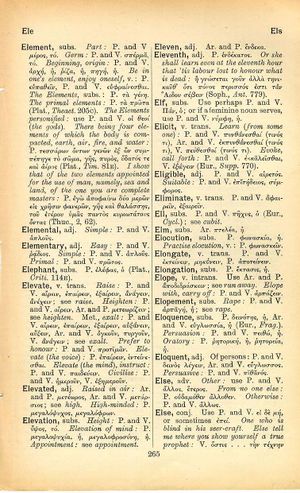else: Difference between revisions
ὦ παῖδες Ἑλλήνων ἴτε ἐλευθεροῦτε πατρίδ', ἐλευθεροῦτε δὲ παῖδας, γυναῖκας, θεῶν τέ πατρῴων ἕδη, θήκας τε προγόνων: νῦν ὑπὲρ πάντων ἀγών. → O children of the Greeks, go, free your homeland, free also your children, your wives, the temples of your fathers' gods, and the tombs of your ancestors: now the struggle is for all things.
(CSV4) |
m (Text replacement - "<b class="b2">Hec.</b>" to "''Hec.''") |
||
| Line 14: | Line 14: | ||
POLY. <b class="b2">No.</b> <b class="b2">Else you would not have trapped me thus by stratagem.</b> | POLY. <b class="b2">No.</b> <b class="b2">Else you would not have trapped me thus by stratagem.</b> | ||
ἙΚ. σοὶ δʼ οὐκ ἔχρησεν οὐδὲν ὧν ἔχεις πόνων; | ἙΚ. σοὶ δʼ οὐκ ἔχρησεν οὐδὲν ὧν ἔχεις πόνων; | ||
ΠΟΛΥ. οὐ γάρ ποτʼ ἂν σύ μʼ εἷλες ὧδε σὺν δόλῳ.(Eur., | ΠΟΛΥ. οὐ γάρ ποτʼ ἂν σύ μʼ εἷλες ὧδε σὺν δόλῳ.(Eur., ''Hec.'' 1268). | ||
}} | }} | ||
Revision as of 11:51, 7 August 2017
English > Greek (Woodhouse)
adv.
Other: use P. and V. ἄλλος, ἕτερος. From no one else: P. οὐδαμόθεν ἄλλοθεν. Otherwise: P. and V. ἄλλως. conj. Use P. and V. εἰ δὲ μή, or sometimes ἐπεί. One who is blind in his seer-craft. Else tell me where you show yourself a true prophet: V. ὅστις . . . τὴν τέχνην ἔφυ τυφλός. ἐπεὶ, φέρʼ εἰπέ, ποῦ σὺ μάντις εἶ σαφής (Soph., O.R. 389). This seems to me to be the case with this man, else how is it just . . .? P. ὅπερ καὶ οὗτος ἐμοί γε δοκεῖ πάσχειν· ἐπεὶ, φέρε, πῶς ἐστι δίκαιον . . .; (Dem. 879). You had no better advice to offer, else they would not have followcd mine: P. σὺ οὐχ ἕτερα εἶπες βελτίω τούτων· οὐ γὰρ τούτοις ἂν ἐχρῶντο (Dem. 294). I love my own children, else were I mad: φιλῶ ἐμαυτοῦ τέκνα· μαινοίμην γὰρ ἄν (Eur., I.A. 1256). HEC. Did not (the god) prophesy to you any of the woes you now endure? POLY. No. Else you would not have trapped me thus by stratagem. ἙΚ. σοὶ δʼ οὐκ ἔχρησεν οὐδὲν ὧν ἔχεις πόνων; ΠΟΛΥ. οὐ γάρ ποτʼ ἂν σύ μʼ εἷλες ὧδε σὺν δόλῳ.(Eur., Hec. 1268).

